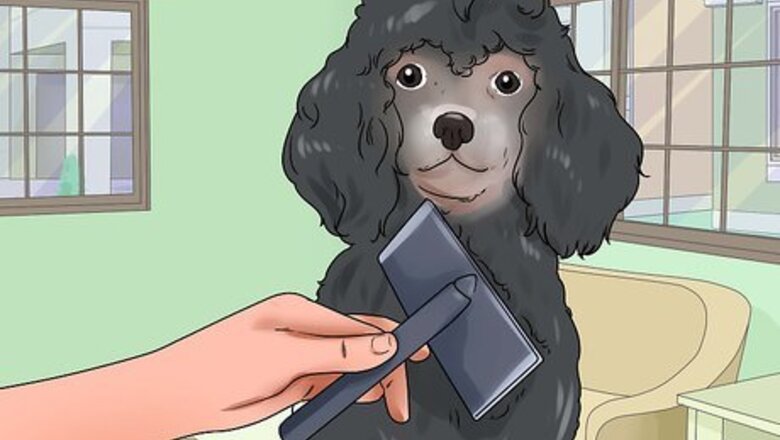
views
Cleaning and Bathing
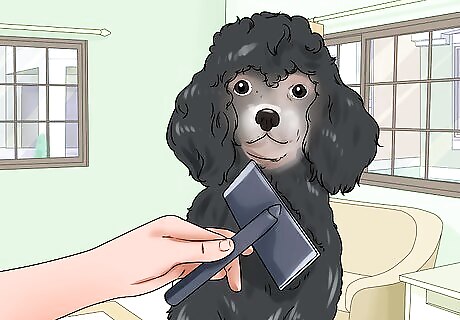
Brush your dog. Brushing is important for all dogs, but especially for poodles. Poodle hair can easily get matted together as the dog sheds, and for this reason, it is often recommended that poodles with long hair be brushed every day. Brushing once or twice every week is generally acceptable if the dog has shorter hair. Start brushing at the poodle’s neck and move down toward the tail. Use a slicker brush to gently remove thick tangles and mats.
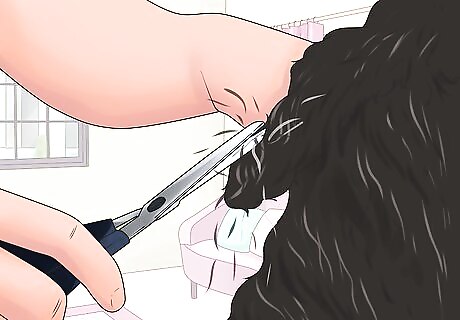
Remove thick mats or tangles with scissors. Mats or tangles that won’t brush out should be carefully cut out with scissors. It's important to remove mats whenever you find them, as they can pull at the skin, causing discomfort to your pet. Because of the way they shed their hair, poodles are prone to matting if they go for long periods without grooming. In extreme cases, matting can cause skin infections that are painful for your pet. EXPERT TIP Marie Lin Marie Lin Licensed Pet Groomer Marie Lin is a Licensed Pet Groomer and the Owner of Marie's Pet Grooming, a grooming salon based in New York City. Marie has over 10 years of pet grooming experience specializing in dogs and cats. She earned her pet grooming certification from the American Academy of Pet Grooming New York in 2009 and is also a member of the National Dog Groomers Association of America. She earned a Master of Business Administration (MBA) from Hawaii Pacific University in 2007. Marie Lin Marie Lin Licensed Pet Groomer Expert Warning: If you have to cut out a thick mat, use scissors to cut through in the direction of the hair growth—not across! Also, be sure you can see the pointed tip of the scissors before you cut, to ensure you don't cut the dog's skin. Afterward, the mat should be loose enough to be combed out.
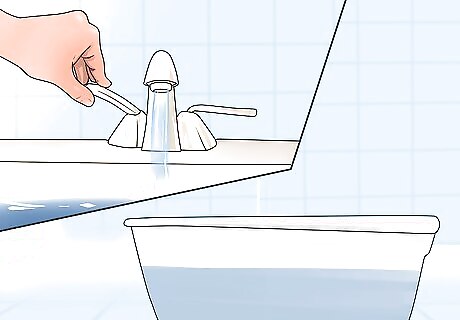
Prepare a bath. It’s important to bathe your dog, especially if he has gotten dirty while playing outdoors. You should be sure to bathe your dog before trimming him with clippers, as dirty or overly oily fur can prematurely dull your clipper blades. But bathing your dog too often can wash away the natural oils that your dog’s coat needs. The ASPCA recommends bathing your dog every three months or so unless more frequent baths are required. Fill your bathtub with a few inches of water. Remember, it doesn’t need to be full, and your dog will likely splash around quite a bit. You’ll only need the water to be about ankle-deep.
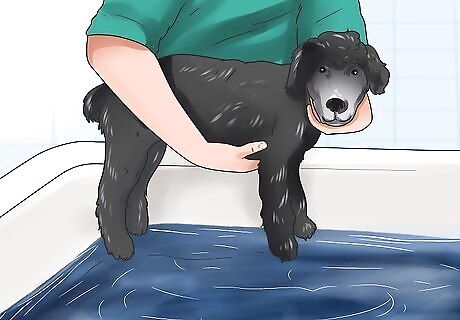
Lift your dog into the bathtub and wet its coat. Some dogs treasure bath time, while others dislike being bathed. If your dog does not enjoy bathing, you may want to get a helper to aid you in keeping the dog in the tub during the bath. Use a cup or a pitcher to flush water all over your poodle from head to tail. Try to avoid getting water in your poodle’s eyes and ears.
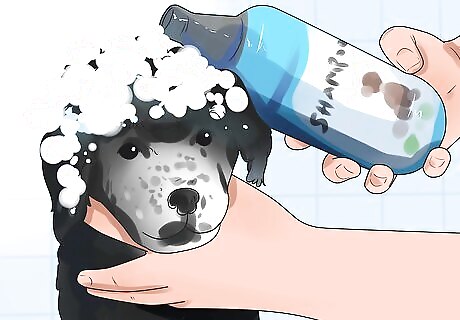
Lather shampoo from the poodle’s head to its tail. If you massage your poodle's back while rubbing in the shampoo, he may enjoy the bath a bit more. Use a shampoo specifically made for dogs. Not only does dog shampoo have everything your poodle’s coat needs to remain healthy, but it also avoids ingredients in human shampoo that might be harmful to your pet.
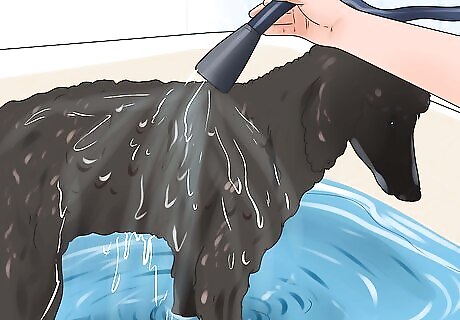
Rinse your poodle’s coat thoroughly, again working from head to tail. Continue rinsing with clean water until the water runs clear and no longer appears soapy. Be careful not to get any soapy water into your poodle’s eyes and ears.
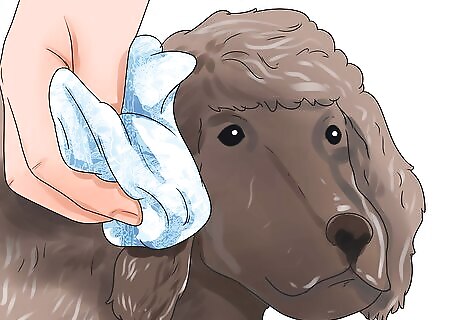
Dry your dog’s coat. Use a towel to gently dab and wipe your poodle’s coat from head to tail. You may want to brush your poodle’s coat again after the bath, then dry with a towel a second time after brushing. Be sure to thoroughly clean and dry your dog’s ears with a towel or clean paper towels. It's important to clean inside and under your dog's ears to prevent bacteria, yeast, and parasites from living there.
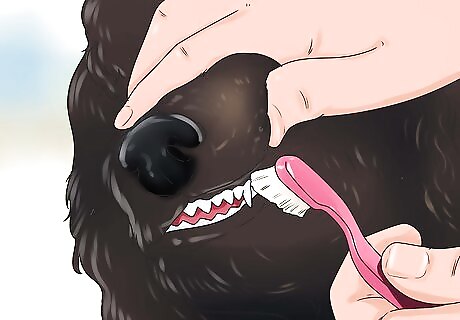
Brush your poodle’s teeth. Use a toothbrush to gently remove plaque buildup around the base of your poodle's teeth. Choose a toothpaste made specifically for dogs. Your poodle will inevitably swallow some of the toothpaste, and human toothpaste can upset your dog's stomach. Brush gently. Remember, your dog may not be used to having its gums rubbed. Brushing too hard or fast can cause pain to your poodle's sensitive gums. Be consistent with your poodle's dental care. Brushing your dog's teeth can help prevent tartar buildup, which causes periodontal disease and can lead to potentially-fatal bacterial infections.
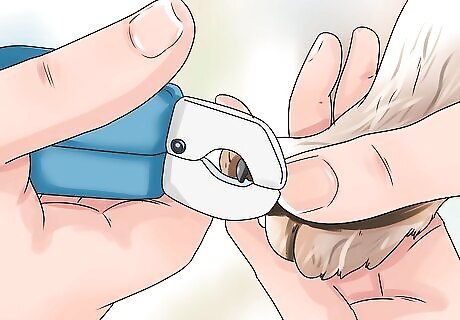
Trim your dog’s nails. It’s important to keep your dog’s nails trimmed, as having long nails can lead to painful problems for your pet. But you also want to avoid trimming them too short, as this can cause bleeding. You may be able to trim your dog’s nails with a pair of scissors, but you will likely find it easier if you purchase a specialty tool, like a guillotine trimmer. Don’t cut the quick. This is the part of the nail closest to your dog’s “toes,” and it’s very sensitive and can bleed easily. Ask your veterinarian or a professional groomer to help trim your dog’s nails if you have a hard time doing it at home.
Preparing to Clip
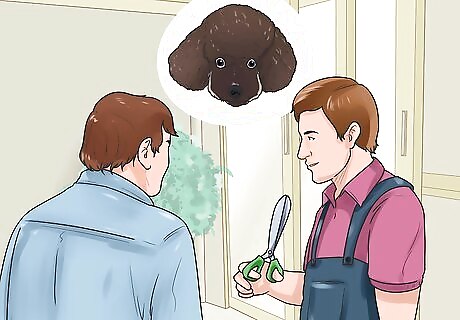
Choose a cut for your poodle. There are many different styles and cuts that poodle owners can choose from. Some common cuts are the Puppy Clip, the Continental Clip, and the Bikini Clip. While there are other grooming options, these are the most common. Consult a professional groomer on which cuts would be best for your dog. Remember, if you’re doing most of your dog’s grooming at home, you’ll need to commit to a certain amount of time and effort. Some cuts are easier to style and maintain than others. All of the common styles involve trimming or shaving the poodle’s face, feet, and the base of the tail. The style of the poodle’s body fur changes significantly based on the chosen clip.
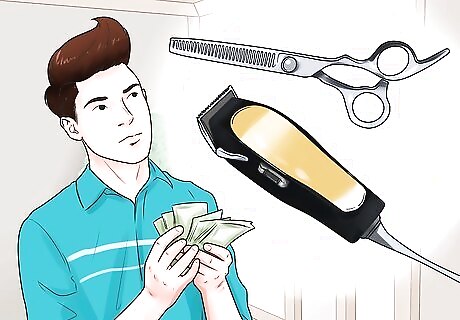
Invest in good quality clippers and scissors. Though it may seem tempting to buy a cheaper pair of clippers or scissors, getting a higher-quality product will be better for your dog. Better clippers are less likely to scrape your dog’s skin or pull his fur while cutting. A cordless clipper will make the grooming much easier for you! High-quality clippers such as Laube, Andis, or Oster cost around $125-$175. They should last much longer than their less expensive counterparts. Note that many groomers seem to prefer Andis or Laube over Oster, as Oster clipper blades can heat during trimming. If you do use Oster, you may want to have extra blades of the same size so that you can switch them out if they become heated. Good scissors made for grooming may cost around $50. These scissors should be sharp and comfortable for you to cut with. You may want to try out different models before purchasing them.
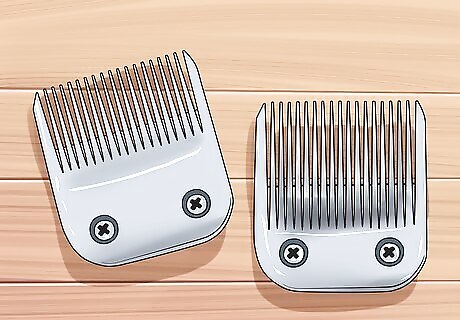
Use the right blades. Clippers have interchangeable blades that are numbered to indicate the length that they will leave the fur after trimming, with higher numbers indicating shorter fur. You will likely need a variety of clipper blades: start with a 5, 7, 10, 15, and 30. If you cannot afford to get many different blades or you’re just starting out, begin with at 10 or 15. Be aware that use of 30 and 40 blades can be quite difficult and should usually be left to experienced or professional groomers. Improper use of these (very short) blades can scrape or burn your poodle’s skin.
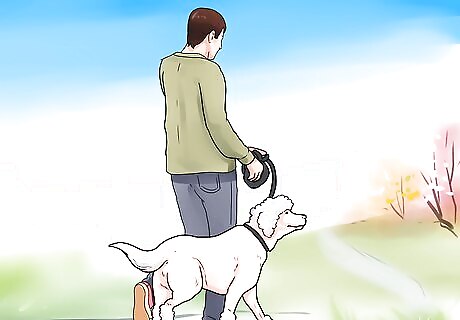
Allow your dog to exercise prior to trimming. Trimming takes some time, and if your pup is well-rested, he may not sit still long enough for you to finish. Taking him to the park or on a long walk for exercise before you begin may lead to a more cooperative subject.
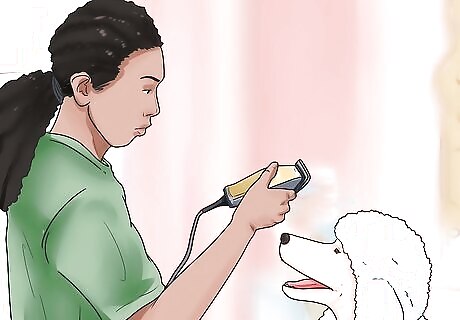
Introduce your dog to the clippers. Before you begin clipping, turn the clippers on around your dog. This is especially important for a puppy or a poodle who has not been regularly groomed. Over time, your dog should become more and more comfortable being around the clippers. You may want to have a professional groomer clip your poodle the first few times so that you do not have to worry about both introducing your dog to the clippers and learning to clip the fur.
Trimming Face and Topknot
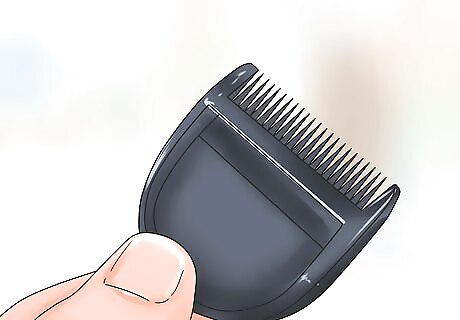
Select a trimmer blade. The trimmer blade you select will be a combination of your dog’s skin sensitivity (white poodles tend to have more sensitive skin than black poodles), your level of expertise, and the reason for your trimming. A higher blade number (such as 30) is often used by professional or expert groomers to prepare a poodle for showing. However, if you are not planning to show your dog or you are just starting as a groomer, a lower blade number (such as 9 or 10) should be sufficient.
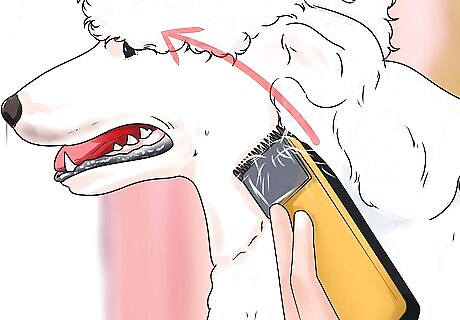
Shave from the ear opening to the eye. Turn the clipper on and place it just underneath the opening in the dog’s ear. Trim from the ear towards the eye, creating a line from the ear opening to the eye.
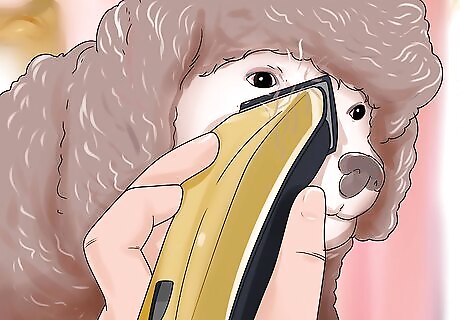
Shave the area between the poodle’s eyes. Place the clippers right next to the inside of one eye and pull down towards the nose for an inch or two. Then move the trimmer over slowly until the area between the eyes has been shaved.
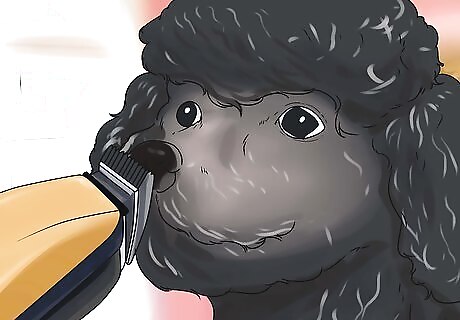
Shave the poodle’s snout. Begin in the space you have just shaved between the dog’s eyes and shave down the poodle’s snout towards the nose. Finish shaving the poodle’s snout by trimming from the nose along the sides of the lips/face back towards the ears. Be aware that you may have to shave in more than one direction (up or down the snout, for example) to allow for differences in the direction in which the dog’s hair grows.
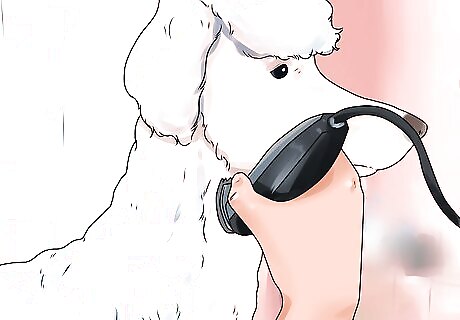
Trim the dog’s neck. Gently lift the dog’s snout and trim from the tip of the chin down towards the neck. Shave the dog’s neck area, stopping when it reaches the chest. The shape can be in a V or a U from beneath the ears down to where the chest and neck meet.
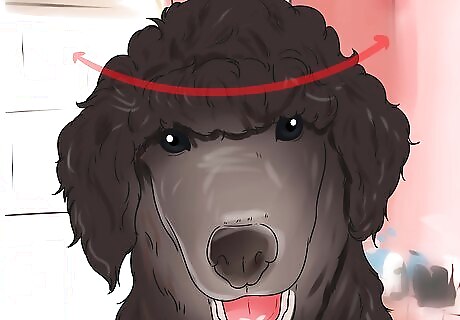
Leave the fur long above the dog’s eyes. Almost every poodle clip involves leaving a puffy topknot on top of the dog’s head. To achieve a topknot, comb the hair on top of the poodle’s head up (away from its body) and then forward so that it comes out over the eyes. Use scissors to cut a “visor” line just above the poodle’s eyes. Use scissors to trim a small arch above the dog’s ears. Brush the topknot hair down towards the ear and use scissors to trim a straight line from the corner of the eye to the ear opening. (You may need to flip the dog’s ear back to clearly see the opening).
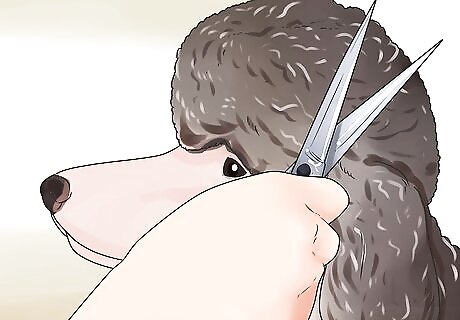
Finish the topknot. Style and shape the topknot by first brushing all the topknot hair to one side. Use curved scissors to trim uneven or overhanging fur. Then brush the topknot to the other side and do the same. Brush the topknot hair straight up. Tilt the dog’s nose down and see whether the topknot is in an oval shape. If there are square corners, trim them off with curved scissors. Look at the top of the topknot and make sure it is not pointy. If there is a peak or a point, trim it with curved scissors so that the dog has a nice, rounded topknot.
Shaving Feet
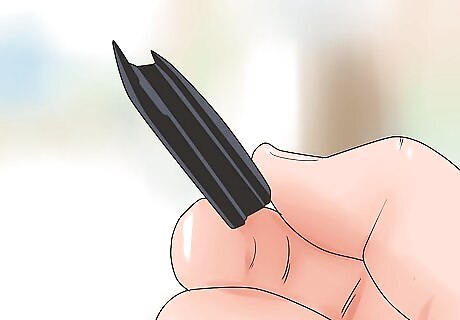
Select a trimmer blade. The trimmer blade you select will be a combination of your dog’s skin sensitivity (white poodles tend to have more sensitive skin than black poodles), your level of expertise, and the reason for your trimming. A higher blade number (such as 30 or 40) is often used by professional or expert groomers to prepare a poodle for showing. However, if you are not planning to show your dog or you are just starting as a groomer, a lower blade number (such as a 10 or 15) should be sufficient.
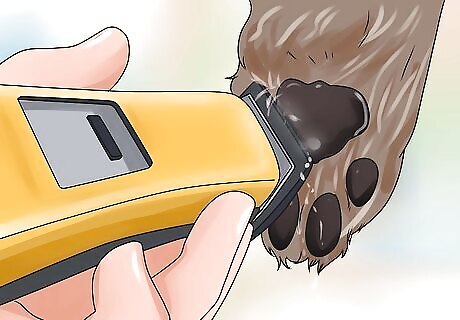
Shave the back of the dog’s foot. Begin above the pads on the feet and find the ankle. Trim down from the ankle to the largest footpad. Cleaning up this area first should enable you to locate the dog’s ankle and set the ankle line.
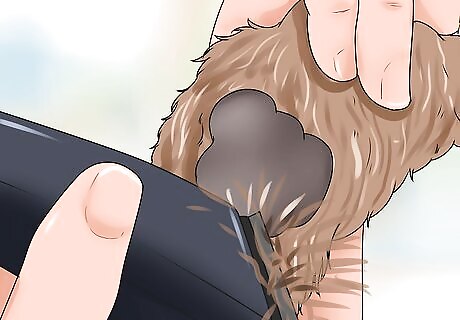
Trim between the footpads. Stretch the dog’s toe pads apart and use the clippers to trim in between each pad. There should be no long fur protruding from between the footpads.
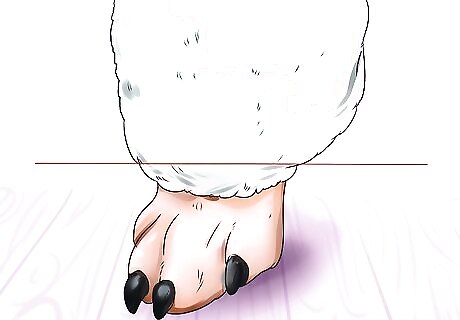
Set the ankle line. The poodle should have cleanly shaven feet, but the ankles should remain covered in longer fur. Be sure that you find where the dog’s ankle bends, and keep the shaved area below hocks.
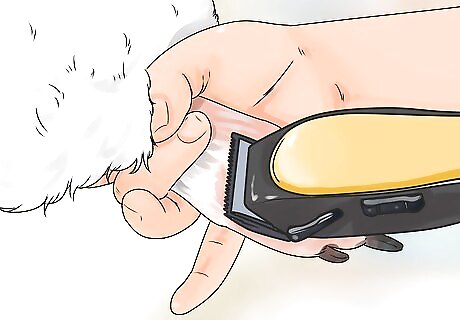
Shave the top of the foot. Shave from the ankle down the top of the foot. You may need to reverse the direction and go up from the toes towards the ankle as well.
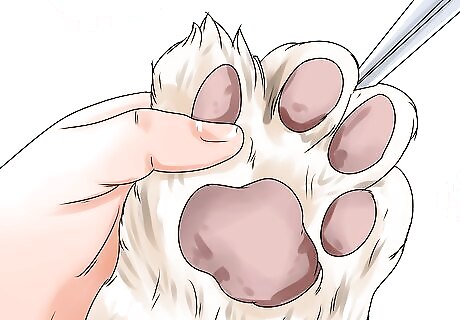
Spread the toes apart. Shave the webbing and sides of each toe. Try to pull the skin tight over the toe, which should pull the fur out and enable you to get to the hard-to-reach places a bit more easily.
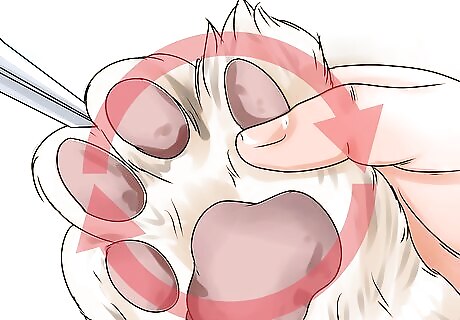
Repeat on each foot. Be sure that the ankle lines on each of the dog’s four paws are even. If one is slightly higher than the others, you may want to go back and trim them all to the same length. Beware of shaving them too high, however, or the cut will look strange.
Trimming Body Fur
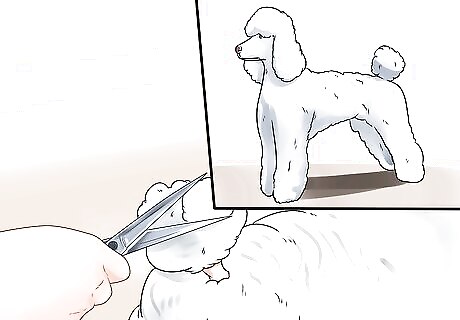
Use scissors for a Puppy Clip. As the name suggests, the Puppy Clip is acceptable for show poodle puppies that are under 1 year of age. The cut consists of longer fur that is more or less the same length with short-trimmed face, feet, and tail base. Cut the poodle’s body and leg fur evenly. The puppy clip is generally done with scissors. Brush your poodle’s fur out neatly, then use scissors to trim the fur at a uniform length along the body and legs. You can do a cut similar to a puppy cut (called a lamb cut) with a very low number clipper blade (such as a 3, 4, or 5). This cut also leaves the fur at a uniform length but may be a bit shorter than a puppy cut due to the use of clippers.
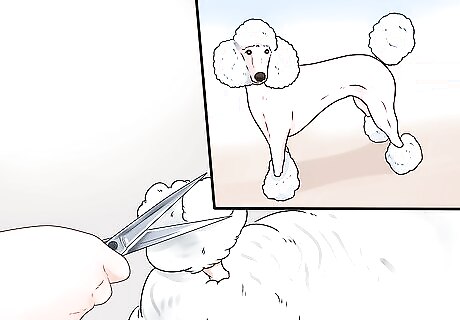
Do a Bikini Clip in warm weather. A Bikini Clip (also known as a Miami clip) is a good choice for poodles in warm summer climates. The Bikini Clip has a closely cut face, feet, and base of the tail. Above the feet, the fur is left very long in “poms” on each leg. The body is trimmed at a uniform length (based on the groomer’s preference). Trim the face, feet, and base of the tail with a 15 blade. Trim the body and legs with a 5 or 7 blade. Trim the topknot, pompoms, and tail pom with scissors. Trim the stomach with a 10 blade.
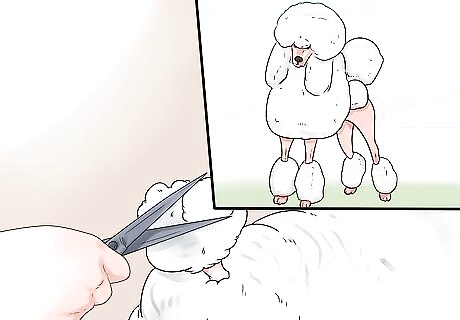
Use a Continental Clip for show dogs. This is the classic poodle look. The Continental Clip involves a very closely shaved face, feet, hindquarters, upper legs, and base of the tail. Very poofy pom-poms are left just above the feet and at the end of the tail. The chest, head, and ear fur is left long but trimmed neatly. Shave the face and feet closely. Shave from the base of the tail to several inches above the base. Shave the front upper legs (from below the “elbow” joint down towards the ankle, but leaving a sizable pompom area over the leg hocks). Shave the back legs. Leave two “rosettes” or round areas of fur above the dog’s hips in the back, but shave from the rosettes down the dog’s legs to the pom-poms on the rear hocks. Use scissors to trim the dog’s remaining long fur. All of the fur should be trimmed so that it is even and rounded.


















Comments
0 comment